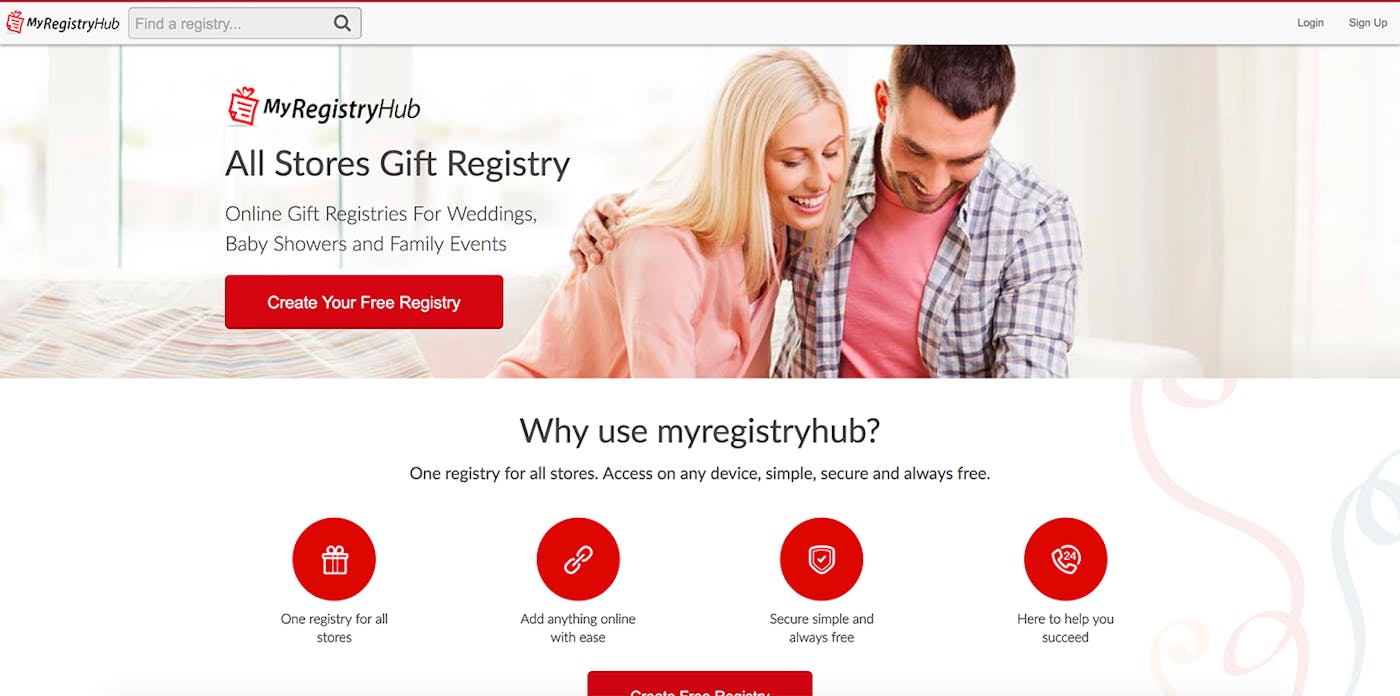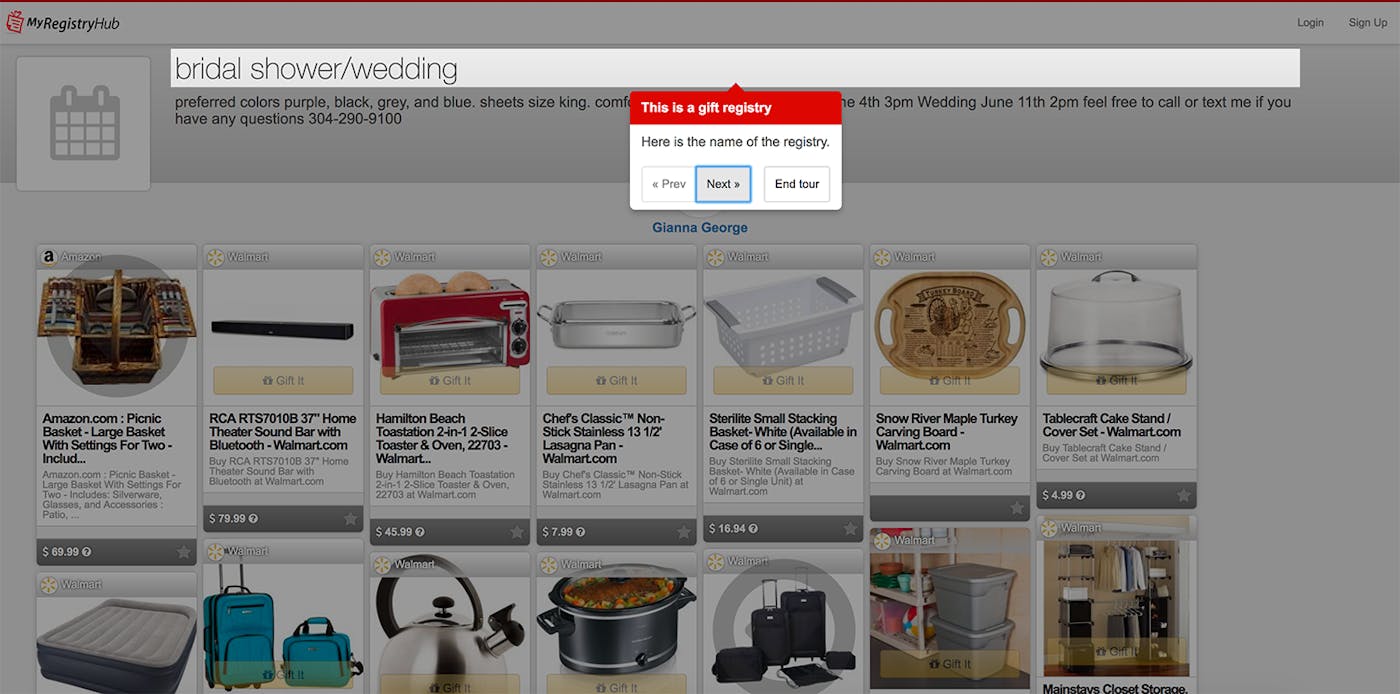Building My Gift Registry Side Project From Scratch to
$150/mo
Hi there! What's your background, and what's Go Registry Hub?
My name is Bas. I grew up in the Netherlands, and after traveling Europe and Africa I continued college in Milwaukee. After college I took a job at the Wisconsin Cheese Mart, where I worked on the e-commerce site and got exposed to PHP programming. Since that time — which is now over 11 years ago — I've never really stopped developing and building professionally and on the side. Currently I work as a Java developer for Target.
Go Registry Hub is an open online gift registry for a variety of event types. My aim is for it to be easier to use than competitors and also mobile-friendly/responsive. Our guests can create registries by adding what others are adding using the integrated Amazon search, or by adding anything online using the bookmarklet. The platform is mostly used by women, and popular categories include housewarming events and baby showers.
Currently we have about 2000 members, and due to continued A/B testing more and more are becoming active. Revenue is still fairly modest at ~$150/month.

What motivated you to create Go Registry Hub? How'd you come up with the idea?
About 3 years ago I started building my third development framework, out of interest. At some point I started to become interested in building a gift registry solution, mostly because it seamed like an interesting challenge. My wife and I poked around for a relevant domain name, and she voted for myregistryhub.com over digstack.com, which was my pick. I still think of changing it :-)
Development is done based on a homegrown development framework called "werock". This gives me the ability to create/support any development pattern which allows elegant implementations of new features. Naturally this "f**k it build it" approach comes with challenges also, but continued evolution of the framework continually pays dividends along the way.
The motivation is that a small group (family and friends) of capable people can build something remarkable. At least that is what I think and try to prove with this project. I continually try to walk a fine line between taking it too seriously (while forgetting to play around) and attempting to keep making frequent real progress. The "werock" platform has A/B testing capabilities built in, which I use to make sure any refactoring or new features help guests engage more deeply with the platform.
The main challenge has been time: I work on this project outside of my full-time job as a Java developer at Target and in addition to taking care of my two little girls.
How have you managed your time working on Go Registry Hub? And what kind of funding have you put into it?
I started working on Go Registry Hub in 2015. During the past summer I wasn't able to put in nearly enough effort due to a big remodeling project. In the last two months I've picked up development again and kicked things up a notch. I am constantly soliciting feedback from friends and family, and can continually re-prioritizing work to be done. Lately I work on the project around 15 hours a week — mostly weekday evenings. I try to shut my laptop by 11pm so I don't get too sick of it :-)
Regarding the budget, I haven't spent much so far. I used 99designs for the logo and landing page design. Between that and help I've gotten from a couple of friends, I've spent about $1500 total.
How'd you build your custom framework "werock"? What's your tech stack?
It's built with PHP 7, APCu, Memcached, MariaDB, and Apache 2 on the back-end; and less, AngularJS, and Bootstrap on the front-end. Although development started against PHP 5.6, with the release of PHP7 I was able to make a lot of great performance updates. Hosting is provided by Digital Ocean, otherwise I use Cloudflare.
I'm working on a mobile app using the Ionic framework. I'm having a lot of fun with it! However, there are so many things to work on that I'm having trouble getting it out the door in a reasonable amount of time.
How are you growing Go Registry Hub? What's your business model, and where does your traffic come from?
Our business model is pretty simple. We try to delight our guests with a slick UI and a mobile-friendly platform for creating and managing gift registries. Once a guest creates a gift registry and shares it with family and friends, new users are introduced to our platform. Each time a guest or visitor engages with a gift registry and follows a link to a vendor, we add our referral ID where possible. When gifts are purchased we can then collect a commission. This doesn't interfere with the user experience, and we are committed to not use any type of disruptive advertising to generate revenue.
Currently we have between 200-1200 interactions daily, with between 3-20 gifts purchased per day. This is for 2000 users, of which only new users are converting to active users at high rates, due to improvements made to the site over time.
Things really started going a lot better once I started using inspectlet.com the right way. In a spreadsheet I capture about 150 sessions and take notes of pain points or ideas for improvements. Later the ideas or pain points can be normalized. The spreadsheet is setup to count occurrences of similar themes, which creates a prioritized list of areas for improvement. Then I add an estimate of technical difficulty.
Combining tech difficulty and priority gives me a work priority list. Each change is then tested using the built-in A/B testing capability of my "werock" framework. Only when the experiment shows an improvement do we implement the change. Then we repeat the process.

What are your goals for the future? Are there any big challenges you see on the horizon?
User retention is not where we want it yet, and there are countless opportunities to source visitors organically. I'd love to get out the mobile app, and to keep iterating and testing to make sure we keep improving.
At some point the end goal is to build a meaningful company and brand with the ability to give back to the community. Personally, I'd love for this project to provide my family with more time and ability to travel.
What are the biggest lessons you've learned so far? If you had to start over, what would you do differently?
To always test any changes. Even though it certainly takes more development effort and time to collect data, it's worth avoiding mistakes in features/UI which deteriorate user engagement.
My advice to aspiring indie hackers is to do the same and test your assumptions. Before going all-in on a new idea or feature, see what you can do to test how your visitors engage with the feature without building it in full. Once you get positive feedback, then invest your time and effort to build it out.
One specific example: I added a "keep looking" prompt when adding gifts, so the user could continue searching and not have to click "Add Gift" again when browsing for presents. I've run the experiment several times, but each time engagement dropped by ~20%. To me this was counter-intuitive, but because the change was tested we rolled back to the previous state for now. Back to the drawing board!
What's been most helpful to you on your journey? What do you think your biggest advantages have been?
I think that using a homegrown framework was a great advantage. After some time investment, I'm now able to iterate very quickly and with very few issues (regressions, etc).
It can be difficult to clear your head when working on your own product — it's like playing poker with yourself. Taking some time off once in a while is so important to create some distance to see more clearly what to do next.
The biggest advantage I hav is the ability to do both front-end and back-end development relatively well and quickly. This way, not much stands in the way of me rolling out new features.
Where can we go to learn more?
Check out the site at MyRegistryHub.com.
Also, feel free to leave comments or questions below!

Still wondering how he rearched the 2000 users?
Nice ! I have a similar vision concerning frameworks. I prefer to use my own and avoid CMS to (in the long run) be able to push code much faster.
Awesome! And let's not forget how much FUN it is to build something fresh vs reverse engineer a CMS. Thanks for for letting me know I'm not alone! :-)
Can we peek in your Werock framework? The stack sounds cool.
Sure, give me a bit too get a version out in public? Just have to do a bit of cleanup. :-) stay in touch?
Awesome! Yes that would be great. You can ping me here or just connect with me on FB or Twitter